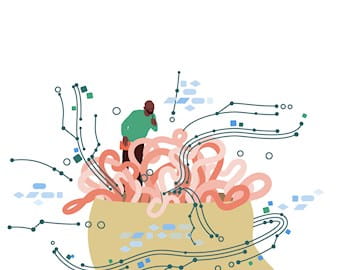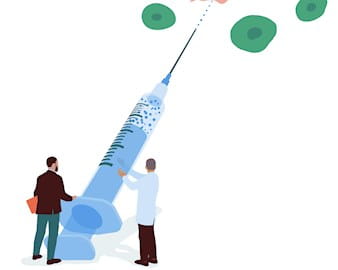Over the course of Chicago Booth’s 125 years, we have seen countless innovations come from our community: Nobel Prize–winning concepts including human capital and the “nudge.” Widely popular apps such as Grubhub and Venmo. Influential dialogue around pressing topics such as A.I. and corporate social responsibility. Ideas out of Booth’s global campuses have been transforming the way people think, interact, and work for more than a century.
But what about the future? As we close out our 125th anniversary celebrations, Booth is looking to what’s next—investing in programs, such as the Master in Management, for younger students; fostering groundbreaking ideas through a growing number of specialized accelerators; and providing support networks for the students and researchers who will come up with the next big thing.
In this story, we feature seven Booth students and alumni who are at the forefront of exciting, pioneering fields. Reforming the US criminal justice system with tech. Making the world a better place through research on behavioral science and algorithms. Creating more sustainable food chains using insect protein—and improving cancer therapies with advanced biotech. Read on to discover how these fierce leaders and entrepreneurs are pushing towards the next frontiers of innovation.
Pushing Criminal Justice into the 21st Century
Our modern-day world is inundated with technology—except when it comes to the criminal justice system in the United States. In and out of the prisons, almost everything is done exclusively on paper.
Current MBA student Michelle Mbekeani, JD ’14, first stared down a bin of letters at Equip for Equality, a Chicago-based nonprofit protecting the civil rights of people with disabilities, where she was part of a team supporting incarcerated individuals who needed help getting accommodations under the Americans with Disabilities Act. All communications were done via snail mail.

“We are working so hard for criminal justice reform within the law, but we have this powerful low-hanging fruit that can be addressed by technology,” says Mbekeani—from appeals to requests for legal help. “We can advocate, protect, enforce, and provide transparency just by using the technology we have. Why aren’t we leveraging that?”
It was this question that led Mbekeani to found Period, a digital platform that gives incarcerated people access to legal assistance as well as advocacy for innocence and post-conviction appeals. The digital platform is paid for by lawyers and other external stakeholders, and is completely free for incarcerated people.
When she first thought of the startup, she was deep into another project, a dating app she’d founded and created, and was wary of wasting the time and money she’d invested in it by pivoting to something new. But mentor Phil Schwarz, ’08, the former CMO of Tinder, urged her that it was better to take the chance early than sink more money into the current project and regret it later on.
“I don’t want pride to prevent my pivot,” Mbekeani recalls thinking at the time. Not long after, Schwarz coached her for her Booth interview, after she decided to pursue her MBA to help her launch Period.
Mbekeani found Booth difficult at first—but the community has been there for her every step of the way. Staff members reached out to check up on her in the first few weeks of class. Michael Alter, clinical professor of entrepreneurship, let her use Period as a group project in his Entrepreneurial Selling course, with her fellow students jumping in to give her honest feedback. And in the New Venture Challenge course, she found help and resources at every turn, from putting together her first-ever financial projection spreadsheet (“my greatest accomplishment after giving birth”) to getting invaluable advice from the judges during the pitch process.
“I can’t believe I’m here,” Mbekeani says. “I’ve always had confidence. But our potential is so limitless, and sometimes you just need to be in a community that reminds you of that.”
“I’ve always had confidence. But our potential is so limitless, and sometimes you just need to be in a community that reminds you of that.”
— Michelle Mbekeani
Period won the John Edwardson, ’72, Social New Venture Challenge, and took home $75,000 in funding. Mbekeani has big plans for the app. She is preparing to shift to working on Period full time, deciding where her betas will be, and continuing to raise funds. She has already mapped out additional platforms and ideas for her overarching umbrella company, Due Tech Process, to pursue.
“When the lack of technology creates barriers to accessing justice and compromises our civil rights, justice is not only literally delayed, but often completely unrealized,” she says. Her goal is to bring the whole system up to speed.
Throughout the process, she knows one skill will carry her forward: her ability to listen. She has a carefully formulated advisory board at Period that includes many correctional-system workers and formerly incarcerated people. She knows stakeholders across all aspects of the criminal justice system, and is ready to talk to them to get Period in prisons throughout the United States.
“If you embrace discomfort, it feels like you are invincible,” Mbekeani says. “I’m known as a person who’s not afraid to ask. I’ve learned the power of being vocal—and that as much as you speak up, you have to listen twice as much.” This power to listen, to negotiate, and to see through the problem to a common solution is what led Mbekeani to come up with Period in the first place—and it will be the skill that most helps her implement it.
Defeating Bias through A.I.
In the age of algorithms, no one truly makes a decision alone. Social media platforms leverage algorithms to try to predict what users want. Algorithms give medical workers recommendations on how best to analyze a patient’s symptoms.
As a PhD student, Diag Davenport, PhD ’22, studied the intersection of behavioral science and artificial intelligence specifically to map out the differences between human and A.I. decision-making.

By understanding how people think and operate, algorithms could help us defeat bias instead of empowering it, Davenport suggests. “If we can connect the science of people with computer science, we can build algorithms that help us connect with each other or do the things we deep down want to do, rather than just make simple assumptions,” he says.
As a Presidential Postdoctoral Research Fellow at the Princeton School of Public and International Affairs, Davenport is on his way to finding a professorship. But he doesn’t see academia as a space solely of theory and data analysis. His ideas are meant to have concrete impact.
“I see research as a means to an end,” says Davenport. “The endgame is changing how people think, changing how institutions operate.” For example, in most real-life applications of algorithms, Davenport explains, one person is making a decision about another person. An algorithmic aid gives the decision-maker a prediction—for example, in the next 30 days, is the subject likely to have a heart attack? Or is the subject likely to pay back a loan?
“We have a lot of evidence that those predictions are better than predictions humans make usually,” says Davenport. “But at the end of the day, the human is still the one making the choice. Trying to figure out how and when people will follow the prediction versus relying on their own intuitions can be the difference between total optimization and biased usage.”
He hopes that his research can unlock ideas on how to best adjust for the way human decision-making happens, and help institutions figure out when to dial in or dial down their interference.
“I see research as a means to an end. The endgame is changing how people think, changing how institutions operate.”
— Diag Davenport
He’s studied concrete issues in social media—such as the Meta algorithm’s influence over who we want to friend and how that can exacerbate racial bias. He’s also studied how algorithms interact with human decision-making in areas such as the criminal justice system, where racial and class bias can be significant problems. Soon he hopes to turn to the field of mental health to improve how and when people can get help.
Yet he remembers that when he first came to Booth as a Black PhD student, he noticed that the few Black professors he knew were almost always studying social issues. At the time, he worried about being pigeonholed, and threw himself into a paper on venture capital and machine-learning techniques.
“For a while, I was almost embarrassed about the paper, because it came from an impure place,” he says. “But then venture capitalists from around the world started emailing me, wanting to understand my research more.” As VCs try to follow the procedures he laid out, it looks like he changed the area for the better. “It’s a nice test run for seeing the impact my research can have, and it helped free me from the insecurity of working on social issues. That’s where my heart is—and I believe that’s the work that’s most needed.”
In many ways, Booth gave him confidence in his own work. The faculty were both generous and intense in their feedback. “I learned how to interrogate data, interrogate institutions, and most of all, understand how people’s motivations interact with the institutions around them,” Davenport says. It was gratifying to see Nobel Prize winners visit the school and “get grilled by Booth faculty, no different than every other student in any department,” he says. “It motivated me to have well-founded confidence. It motivated me to think that the best ideas can win,” he adds.
As he looks forward to being a professor, he hopes to generate a body of research about how institutions, motivations, and bias impact decision-making, producing ideas to motivate and influence both his students and the broader world.
“There’s a lot of harm being done in communities that I care about,” Davenport says. “I hope I can influence people to think harder about how they interact with each other, with algorithms, and with the institutions around them, and vice versa, in order to make people’s lives better.”
Farming Bug Proteins for a More Sustainable Future
We sink an enormous amount of water and energy into feeding the animals we depend on as a food source. In a 2021 study, researchers from the University of Michigan and Tulane discovered that meat consumption is responsible for 31 percent of the US water scarcity footprint. As our climate changes, feeding livestock is looking increasingly unsustainable. But the United Nations reports that the world population is expected to increase by nearly 2 billion in the next 30 years, which will only increase humans’ need for sustenance, particularly from animal proteins.
Dan Griffis, ’20; Will Biggar, ’20; and Sean Madison, ’20, aka “the Booth Bug Boys,” know the solution.
“We don’t really see a world that exists without insect protein feeding those animals to then feed humans,” says Biggar. “We see insect protein filling a critical role in this growth that allows us to all continue to eat the foods we love.”

The three alumni work with Innovafeed, which takes the larvae of the black soldier fly—Hermetia illucens—and farms them. The larvae have a strong nutritional profile and a short life span, plus they thrive living in a confined environment, making it easy to scale production. Innovafeed can then process the insects into proteins and oils to be used as feed ingredients for pigs, chickens, and fish, as well as in pet food—Innovafeed recently partnered with Arch, a hypoallergenic pet food company cofounded by Evening MBA student Gabriel Huertas del Pino.
There’s nothing unusual about this solution. Chickens and fish, for example, eat insects as a significant part of their natural diet. “This is a return to insects’ natural role in the food chain,” explains Madison, who is director of North American business development at Innovafeed.
The company is also able to make organic fertilizer from insect excrement, potentially replacing or cutting into the traditional, carbon-intensive fertilizer business, which in turn makes Innovafeed’s process zero waste.
“Upcycling and circularity”—both processes by which a product or service is renewed or regenerated rather than wasted—“are starting to become trend buzzwords in innovation, and Innovafeed is doing that,” says Griffis, “but in a way that’s incredibly scalable.”
Innovafeed’s first facilities were established in France, but its newest production plant is being built in Decatur, Illinois, thanks in part to the contributions of these three alumni.
As managing director at ADM Ventures, the venture-capital arm of Archer Daniels Midland Company, one of the world’s biggest agribusiness companies, Griffis helped to facilitate a partnership in November 2020 so Innovafeed’s plant could be built alongside ADM’s corn mill, one of the world’s largest.
“Insect protein is kind of out there for a lot of people,” says Griffis. “But I think it’s really important to know the quality of the people around this company. It was started by McKinsey consultants. Some of the largest multinational companies in the world and some of the largest sovereign wealth funds are invested in this business.”
During his time at Booth, Griffis had been a co-chair, along with Biggar, of the FEAD club, Booth’s food, environment, agribusiness, and development student group, and they’d kept in touch. Now he told Biggar about Innovafeed.
Biggar works at Chicago-based Grow Forward, a family office that has a history in food and ag investing. He saw the upside in Innovafeed’s potential to utilize waste products from the ethanol industry to create a higher value protein.
After speaking with Griffis about Innovafeed’s model and expansion, Biggar and Grow Forward created a group that could participate in Innovafeed’s Series D, which would ultimately raise $250 million.
Innovafeed was looking for someone to lead the commercial front for their North American expansion. Biggar and Griffis, recently graduated, talked to Madison, whom they knew from Booth. He’s been with Innovafeed ever since.
“I was searching for a new role in the food space with a company that was mission oriented, and here I am,” says Madison. “It shows the power of the Booth network.”
“We don’t really see a world that exists without insect protein feeding those animals to then feed humans. We see insect protein filling a critical role in this growth that allows us to all continue to eat the foods we love.”
— Will Biggar
Innovafeed’s key differentiator is their industrial symbiosis production model. Each insect-processing facility links directly to an existing grain processing facility via a large pipeline that delivers byproducts from the mill to feed the insects.
Innovafeed facilities are also co-located with their energy source, and power 60 percent of their energy needs through the capture of “waste” energy—steam captured by a hydro-condenser that would have otherwise dissipated into the atmosphere.
The operation has an 80 percent lower carbon footprint, quantified through a published Life Cycle Assessment (LCA), compared with traditional proteins and oils. It’s efficient, sustainable, and affordable.
“Innovafeed’s industrial symbiosis model allows it to be cost competitive with traditional feed ingredients,” Biggar says. “That’s why we believe that it can reach the scale that’s necessary to create substantial change.” The target capacity at the Decatur plant is 60,000 tons of insect protein a year.
In addition to ADM, Innovafeed’s partners include global food corporations and retailers Cargill, Tereos, and Auchan, and sovereign wealth funds Temasek and the Qatar Investment Authority. Another Booth connection, Erin VanLanduit, ’16, is the head of corporate ventures at Cargill and was involved in that partnership.
“This is the start to a long journey,” says Biggar, “but it’s cool to stand up there with two friends that you met at Booth, took classes with, went to TNDC [Thursday Night Drinking Club] with, and now we’re all working together and embarking on the start of a new industry.”
When the Decatur facility had its ground breaking in January, all three Booth Bug Boys were present. Just like Innovafeed’s system, these Boothies have come full circle.
Transforming Cancer Therapies
One in three people will develop cancer during their lifetime, and treatments are famously difficult to endure. Many patients are unable to complete therapy, increasing the risk for relapse and recurrence.
Alnair Therapeutics is hoping to change that.
Thanks to a next-generation biomaterial that can carry a wide range of drugs, combined with a novel drug-release technology, Alnair hopes to transform cancer therapeutics known to have many adverse side effects into less harmful, targeted oncology drugs. Their drug-delivery platform is able to selectively release and concentrate cancer drugs at much higher levels within the cancer cells, while sparing healthy cells and tissues. By doing so, the platform technology may enable cancer therapies to be not only more tolerable for patients, but safer and more efficacious.

“In our early studies, we’ve turned a common chemotherapy agent into a targeted oncology drug. If we can establish this, then it could significantly improve the way we provide cancer treatments,” says Anh Nguyen, ’11, CEO at Alnair Therapeutics. Nguyen is a physician-scientist and seasoned biotechnology executive who initially came to the oncology startup as a mentor through the Compass Deep Tech Accelerator at the Polsky Center for Entrepreneurship and Innovation.
Alnair has made waves in the Booth network. Led by Xiaoyang Wu, associate professor of cancer research and stem cell biology at the University of Chicago, the startup received $175,000 in fall 2022 from the George Shultz Innovation Fund, managed by the Polsky Center. And then it turned its sights to the Edward L. Kaplan, ’71, New Venture Challenge.
Ryan Meyers, ’23, had worked with Dr. Wu before and was looking forward to an easy last quarter before graduation at Booth. But when Alnair asked him to lead the student team in the NVC, he was in. “I would follow Dr. Wu anywhere,” Meyers laughs.
He helped the team build out a presentation-ready pitch deck, work through market discovery, and refine the story into one that both honored the science and was immediately tangible to investors.
“Reworking or designing a new cancer drug with our technology may enable better treatments and ultimately buy more time—maybe years—for patients with cancer,” he says. “We could make a significant impact on the patient journey.” A primary goal of Alnair’s pitch was getting that story across to investors.
And the pitch went well. In spring 2023, Alnair won the 27th annual NVC, walking away with $585,000 in investment, including the $205,000 Rattan L. Khosa, ’79, First-Place Prize. The team also came away with a “network of champions,” says Meyers—from early-round judges who returned to invest to business leaders and alumni they met through professors, who have also contributed invaluable advice and support.
“It’s been just blindingly fast how we’ve been able to scale and move into a de-risked pathway toward commercialization,” says Nguyen. “That is the magic of UChicago.”
“Reworking or designing a new cancer drug with our technology may enable better treatments and ultimately buy more time—maybe years—for patients with cancer. We could make a significant impact on the patient journey.”
— Ryan Meyers
Following the NVC, Alnair was accepted into the Portal investment fund as its newest portfolio company, and has expanded into an office and lab space at Portal’s biotech hub in Chicago’s West Loop neighborhood.
“Our immediate job is to prosecute the technology,” says Nguyen. Over the next 24 months, Alnair will accrue a data package that supports an Investigational New Drug (IND) application with the US Food and Drug Administration. If the IND is successfully authorized, then the next steps will include human clinical trials.
“We’ve been given the privilege to do this work,” says Nguyen. “It’s not going to be an easy journey, but in life they give the tough stuff to people who can do it.”
Meyers—who is now Alnair’s chief business officer—thinks more Booth graduates should consider biotech. “When the dot-com bubble happened and this wave of innovation came, a lot of people were disappointed they didn’t get in sooner,” Meyers says. “Genetic editing and therapies will transform the way the world thinks about medicine in the same way that the internet transformed technology. I would encourage everybody to think about biotech as the next frontier of innovation.”


